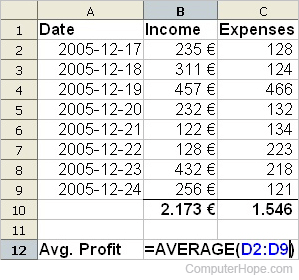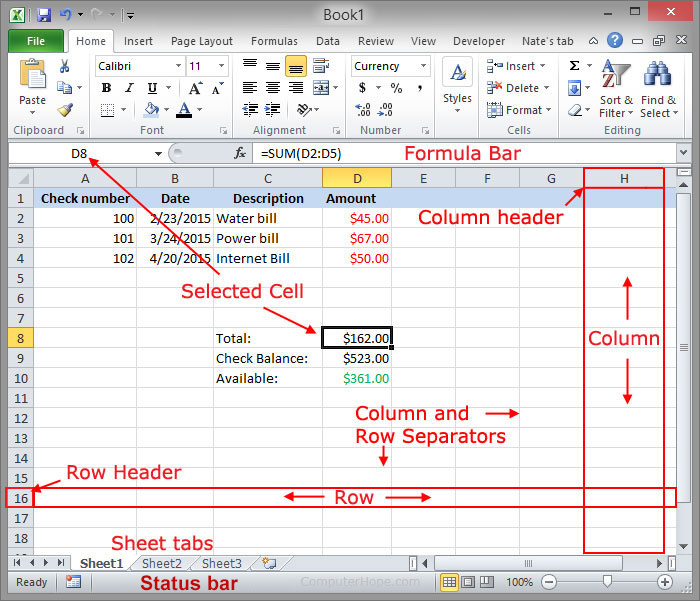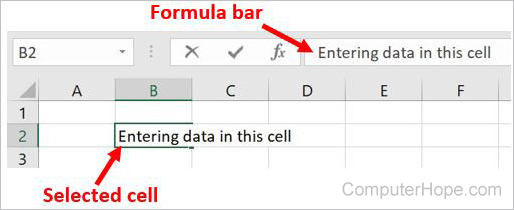


A spreadsheet or worksheet is a file made of rows and columns that help sort, organize, and arrange data efficiently, and calculate numerical data. What makes a spreadsheet program unique is its ability to calculate values using mathematical formulas and the data in cells. An example of how a spreadsheet may be utilized is creating an overview of your bank's balance.
Below is a basic example of what a Microsoft Excel spreadsheet looks like, with all the important features of a spreadsheet highlighted.
 Overview of a Microsoft Excel spreadsheet." width="700" height="601" />
Overview of a Microsoft Excel spreadsheet." width="700" height="601" />
In the above example, this spreadsheet is listing three different checks, the date, their description, and the value of each check. These values are then added together to get the total of $162.00 in cell D6. That value is subtracted from the check balance to give an available $361.00 in cell D8.
Because the terms spreadsheet, workbook, and worksheet are so similar, there often is confusion when trying to understand their differences. When you open Microsoft Excel (a spreadsheet program), you're opening a workbook. A workbook can contain one or more different worksheets that are accessed through the tabs at the bottom of the worksheet your currently viewing. What's often most confusing is that a worksheet is synonymous with a spreadsheet. In other words, a spreadsheet and worksheet mean the same thing. However, most people only refer to the program as a spreadsheet program and the files it creates as spreadsheet files or worksheets.
Today, Microsoft Excel is a popular and widely used spreadsheet program, but there are also many alternatives. Below lists spreadsheet programs used to create a spreadsheet.
Although spreadsheets are used with anything containing numbers, the uses of a spreadsheet are almost endless. Below are other popular uses of spreadsheets.
Spreadsheets are ideal for financial data, such as your checking account information, budgets, taxes, transactions, billing, invoices, receipts, forecasts, and any payment system.
Form templates can be created to handle inventory, evaluations, performance reviews, quizzes, time sheets, patient information, and surveys.
Teachers can use spreadsheets to track students, calculate grades, and identify relevant data, such as high and low scores, missing tests, and students who are struggling.
Managing a list in a spreadsheet is a great example of data that does not contain numbers, but still can be used in a spreadsheet. Great examples of spreadsheet lists include telephone, to-do, and grocery lists.
Spreadsheets can keep track of your favorite player stats or stats on the whole team. With the collected data, you can also find averages, high scores, and statistical data. Spreadsheets can even be used to create tournament brackets and help track fantasy football stats.
In a spreadsheet, data is entered in one or more cells. To enter data in a cell, follow the steps below.

To add additional data to a cell that already has data entered in it, follow the steps below.
Although some uses above could be done in a word processor, spreadsheets have a considerable advantage over word processors when using numbers. It would be impossible to calculate multiple numbers in a word processor and have the value of the calculation immediately appear. Spreadsheets are also more dynamic with the data and can hide, show, and sort information to make processing lots of information easier.
An active worksheet is the worksheet that is currently open. For example, in the earlier Excel picture, the sheet tabs at the bottom show "Sheet1," "Sheet2," and "Sheet3," with Sheet1 being the active worksheet. The active tab usually has a white background behind the tab name.
In Microsoft Excel 2016 and earlier, and OpenOffice Calc, there are three sheet tabs that open (Sheet1, Sheet2, and Sheet3) by default. In Google Sheets, your spreadsheets starts with one sheet (Sheet1).
In Microsoft Excel 365, by default, there is only one sheet tab that opens (Sheet1) when you create a workbook.
The default number of worksheets in a new workbook is 255. However, once the file is saved, you can add as many as your hard drive capacity allows.
Not to be confused with the file name, in Microsoft Excel, there is a 31 character limit for each worksheet name.
In all spreadsheet programs, including Microsoft Excel, rows are labeled using numbers (e.g., 1 to 1,048,576). All columns are labeled with letters from A to Z, then with two letters. For example, after the letter Z, the next column is AA, AB, AC, . AZ and then incrementing to BA, BB, BC, etc., to the last column XFD.
When working with a cell, you combine the column with the row. For example, the first cell is in column A and on row 1, so the cell is labeled as A1.
We've created a Microsoft Excel spreadsheet that can be downloaded and opened in any spreadsheet program including Microsoft Excel. This spreadsheet helps illustrate some a spreadsheet capability, formulas, and functions used in a spreadsheet, and lets you experiment with a spreadsheet.
The same spreadsheet is also available on Google Sheets. Visit the link below to open the spreadsheet in view mode in Google Sheets. To edit any of the values, click File and then Make a copy option to save it to your Google Drive.
Before computerized spreadsheets ledger paper was used to keep track of numbers and make calculations. In fact, many accountants and other individuals continued to use ledger paper even after the release of spreadsheet programs because they didn't trust computers to make proper calculations.